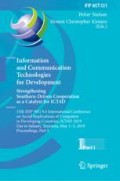Abstract
To support global humanitarian organizations in carrying out interventions in project sites, information is needed that is situationally relevant and timely, while also being relevant to the HQs. The macro-level formal institutional conditions of the HQ and informal constraints at the project sites shape the design and content of Humanitarian Health Management Information Systems (HHMIS), and we focus in the paper on the aspect of information use. We use an ensemble view of the HHMIS, comprising of paper, the computerized system based on DHIS2, and other tools like Excel, to understand how these different components have varying affordances and are influenced differently by the formal and informal institutional conditions. Our theoretical perspective is thus shaped by the notion of “institutional affordances” which we draw upon to understand the affordance actualization of the HHMIS. We identify through our empirical analysis based on a project site in South Sudan, three key affordances relevant to the use of data – operationability, accountability and contextuability. Our analysis makes two key contributions: One, the different affordances of the components in the ensemble have interaction effects, sometimes positively influencing actualization and at other times is limiting. Two, we identify 4 sets of institutional (both formal and informal) influences on actualization coming from availability of information, existing maturity in the use of information, unique features of the humanitarian setting and technical features. We believe this paper makes an overall contribution in helping to situate the informational challenges faced by humanitarian organizations more firmly in the ICT4D agenda.
Access this chapter
Tax calculation will be finalised at checkout
Purchases are for personal use only
References
Thieren, M.: Health information systems in humanitarian emergencies. Bull. World Health Organ. 83(8), 584–589 (2005)
ALNAP: The State of the Humanitarian System. ALNAP, London (2015)
Orlikowski, W.J., Iacono, C.S.: Research commentary: desperately seeking the “IT” in IT research - a call to theorizing the IT artifact. Inf. Syst. Res. 12(2), 121–134 (2001)
Gibson, J.J.: The Ecological Approach to Visual Perception. Houghton Mifflin, Boston (1979)
Stoffregen, T.: Affordances as properties of the animal-environment system. Ecol. Psychol. 15(2), 115–134 (2003)
Chemero, A.: An outline of a theory of affordances. Ecol. Psychol. 15(2), 181–195 (2003)
Chemero, A., Turvey, M.: Complexity, hypersets, and the ecological approach to perception-action. Biol. Theory 2, 1–14 (2007)
Strong, D.M., et al.: A theory of organization-EHR affordance actualization. J. Assoc. Inf. Syst. 15(2), 56–85 (2014)
Lanamäki, A., Thapa, D., Stendal, K.: When is an affordance? Outlining four stances. In: Introna, L., Kavanagh, D., Kelly, S., Orlikowski, W., Scott, S. (eds.) IS&O 2016. IFIPAICT, vol. 489, pp. 125–139. Springer, Cham (2016). https://doi.org/10.1007/978-3-319-49733-4_8
Hausvik, G., Thapa, D.: What you see is not what you get” - challenges in actualization of EHR affordances. In: International Conference on Information Systems Proceedings, Seoul (2016)
Sahay, S., Mekonnen, S.M., Gizaw, A.A., Sæbø, J.I.: Interplay of institutional logics and implications for deinstitutionalization. Inf. Technol. Int. Dev. 6, 1–19 (2010)
North, D.C.: Institutions, Institutional Change and Economic Performance. Cambridge University Press, Cambridge (1990)
Powell, W.W., DiMaggio, P.: The iron cage revisited: institutional isomorphism and collective rationality in organizational fields. Am. Sociol. Rev. 48, 147–160 (1983)
Orlikowski, W.J., Barley, S.R.: Technology and institutions: what can research on information technology and research on organizations learn from each other? MIS Q. 25(2), 145–165 (2001)
Alford, R.R., Friedland, R.: Powers of Theory: Capitalism, the State and Democracy. Cambridge University Press, Cambridge (1995)
Alford, R.R., Friedland, R.: Bringing society back in: symbols, practices, and institutional contradictions. In: The New Institutionalism in Organizational Analysis, pp. 232–263 (1991)
Piotti, B., Chilundo, B., Sahay, S.: An institutional perspective on health sector reforms and the process of reframing health information systems. J. Appl. Behav. Sci. 42(1), 91–109 (2006)
MSF Web site: About us. https://www.msf.org. Accessed 17 Oct 2018
MSF-Spain: MSF Spain Annual Report 2017. MSF Spain, Barcelona (2018)
Walsham, G.: Interpretive case studies in IS research: nature and method. Eur. J. Inf. Syst. Proc. 4(2), 74–81 (1995)
Vila-Pozo, M.M, Sahay, S.: Humanitarian health information systems: different challenges and responses. In: European Conference on Information Systems Proceedings (2018)
DHIS2: Health Information Systems Programme (HISP) - University of Oslo. https://www.dhis2.org/. Accessed 17 Oct 2018
Walsham, G.: Are we making a better world with ICTs? Reflections on a future agenda for the IS field. J. Inf. Technol. 27, 87–93 (2012)
Acknowledgments
We would like to explicitly express our recognition to the headquarters and field staff who are working to provide quality medical care to population in the most remote and inhospitable settings. We are deeply grateful and appreciate the efforts made by Cristian Casademont, Alejandro Casado, Martha Kihara, Conor Prenderville and Maria Jose Sagrado, and make this field visit possible, and the time dedicated from field staff from their spare time to contribute to this research project.
Author information
Authors and Affiliations
Corresponding author
Editor information
Editors and Affiliations
Rights and permissions
Copyright information
© 2019 IFIP International Federation for Information Processing
About this paper
Cite this paper
Vila-Pozo, M.M., Sahay, S. (2019). Institutional Shaping of Affordances: Implications on Information Use in Global Humanitarian Organizations. In: Nielsen, P., Kimaro, H.C. (eds) Information and Communication Technologies for Development. Strengthening Southern-Driven Cooperation as a Catalyst for ICT4D. ICT4D 2019. IFIP Advances in Information and Communication Technology, vol 551. Springer, Cham. https://doi.org/10.1007/978-3-030-18400-1_41
Download citation
DOI: https://doi.org/10.1007/978-3-030-18400-1_41
Published:
Publisher Name: Springer, Cham
Print ISBN: 978-3-030-18399-8
Online ISBN: 978-3-030-18400-1
eBook Packages: Computer ScienceComputer Science (R0)


